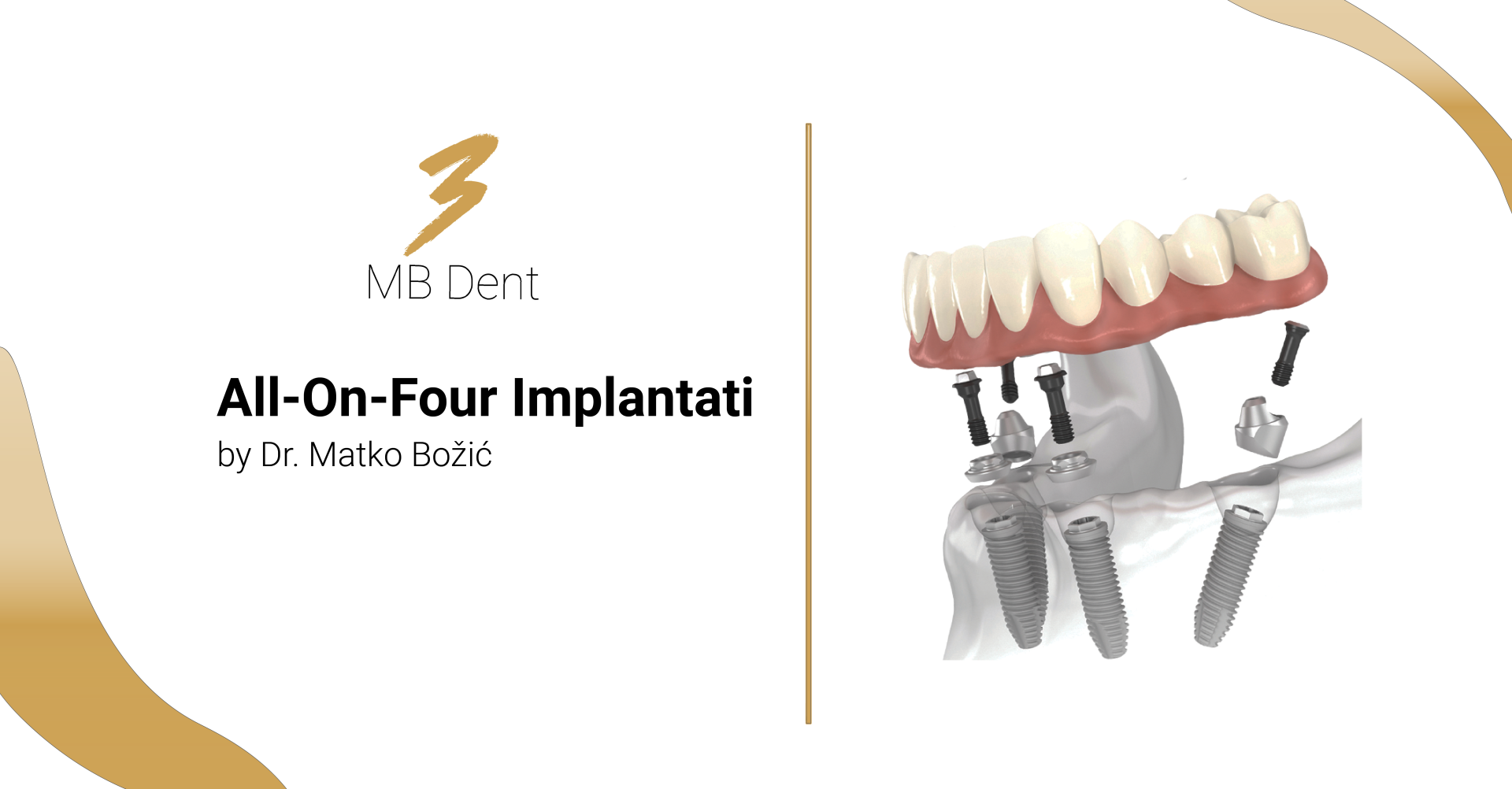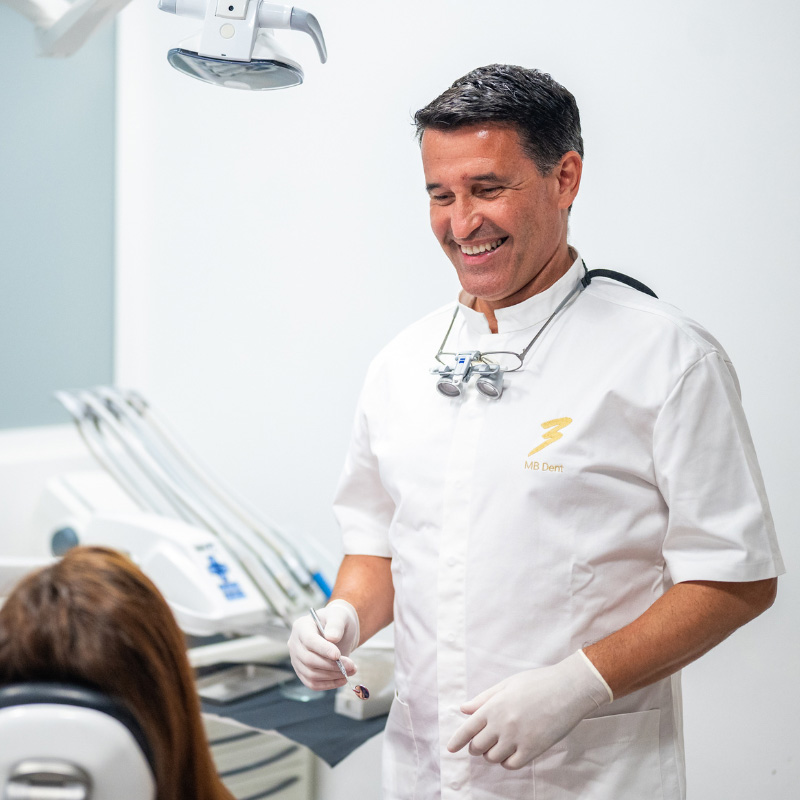Teeth can be cracked or weakened due to long-term decay, night grinding (bruxism), discolored due to genetic causes, long-term use of certain medications, bad habits of consuming large amounts of coffee, tea, drinking mineral drinks, smoking, or poor long-term hygiene. All these reasons can be an indication for the creation of dental crowns.
Scheduling an appointment at a dental clinic for the creation of ceramic crowns or tooth caps can cause discomfort for many patients, but for the highly specialized doctors at MB DENT clinic, this is a routine everyday task.
Here are the answers to the 7 most common questions patients ask about ceramic crowns or dental crown creation.
Do I really need a tooth cap?
There are many indications when dental medicine doctors suggest dental crowns. The most common indications are worn teeth or highly discolored teeth, and they are recommended to strengthen the crown in endodontic treatments of teeth from which the nerve has been removed and where the natural tooth is greatly destroyed by decay, and there is a high probability that if restored with composite materials, the entire tooth will soon break due to chewing forces.
Dental crowns are recommended in situations where combined dental works (tooth caps and dental prostheses) are made as carriers for existing prostheses.
Also, the best indication for a ceramic crown is a crown on an implant when one or more teeth are missing.
Will dental crowns and dental bridges look natural?
Of course, ceramic crowns are made in multiple layers, and to obtain natural shades, from 6 to 12 colors are used to achieve a natural look of the crown. They certainly do not look like artificial teeth but are very natural and beautiful. The color comes from the depth of the crown, so the ceramic is applied and baked in several layers, to mimic the light breakage as in a natural tooth.
What if the patient wishes to create six or more teeth?
It is very important for the patient to clearly explain their desires and expectations to the doctor, so that the entire preparation protocol and designing of the new smile goes without surprises for both parties.
At the MB DENT clinic, we specialize in Digital Smile Design, and we always photograph patients before the procedure, create a digital presentation, and with the help of models and waxing (mock-up), make a simulation of the new smile and present the new situation in the patient’s mouth to the patient, but what is important to emphasize, before the start of the procedure.
We take many parameters into account, such as the size of the previous teeth, the shape of the face, measurement on the model, the shape of the lips and the smile line, and of course, choosing the color according to the skin color of the face, hair, eyes, and of course according to age.

How many visits to the clinic are needed to create a dental crown or bridge?
The creation of a dental crown or bridge usually requires two to three visits. At the first visit, the doctor prepares the sites for crowns, takes impressions in a classical or digital way, and creates a temporary composite crown directly in the mouth so the patient does not leave the clinic toothless. After the dental crown or bridge is made in the laboratory, all the parameters of the ceramic crown creation are reviewed, and if necessary, corrections are made so that the dental crown looks perfect. The final part of the protocol is the cementing of the crown.
Does the creation of a dental crown bed hurt?
In today’s era of good local anesthetics, the treatment is painless for the patient. Of course, some patients are more sensitive to pain, while others are less. Most often, patients feel discomfort to cold or hot sensations after placing a temporary crown. If sensations are noticed, they are alleviated by coating the teeth with special liquids. Of course, it is good to consult with the doctor if necessary.
What type of material is used for making dental crowns?
There are several types of ceramic crowns. The most common division is into metal-ceramic and non-metal aesthetic crowns. The difference between these two types of crowns is that the metal-ceramic crown has a metal base of 0.3 to 0.5 mm thickness on which the ceramic is subsequently baked, while in the case of non-metal, the zirconia crown can be completely made of zirconia in a precise CAD/CAM machine, or the core can be made of zirconia and additional ceramic is baked on it. Such a crown is called a zirconia crown or colloquially zircon on the tooth.
What is the lifespan of tooth caps or dental crowns?
If dental crowns are made according to all the rules of the dental profession and, of course, the best materials are chosen, then the result must last for years. It is very important to inform patients that hygiene of teeth and crowns must be performed two to three times a day with regular brushing with a toothbrush and toothpaste containing fluoride and treated with interdental floss, at least in the evening before bedtime.
The most common problems can occur if patients do not maintain mandatory oral hygiene and do not come for scheduled control examinations twice a year, when bacteria and causes of gum inflammation are removed by polishing and cleaning tartar.
Problems that occur when hygiene is not maintained are gum inflammation and receding gums, when caries and tooth inflammation can occur under dental crowns. It is necessary to advise patients to avoid biting hard food, and if diagnosed with night grinding, to definitely make and wear guards against night grinding.
During the night, bruxist patients (night grinders) can develop strong grinding forces up to 100 N/cm2, which can cause ceramic cracking.
Can caries develop on a dental bridge and crown?
Caries cannot develop on a dental crown, but it can under the crown. Without proper hygiene, caries can develop under the dental cap. When this happens, your crown no longer sits correctly on the prepared tooth and can eventually fall off when the cement with which it was cemented dissolves.
It is very important that your teeth and restored teeth (tooth caps, composite fillings, or dental veneers) are regularly examined at any symptom of gum bleeding or sensitivity of the carrier teeth. With regular examinations by a doctor of dental medicine or specialist and regular cleaning of tartar, you prevent the possibility of developing caries under the crown and inflammation of the gums.
Warranty
Lifetime warranty on all implants and superstructures against breakage.
Five years warranty on all metal-ceramic and zircon-ceramic crowns.
Five years warranty on all wironit dentures.
For any additional information, follow the blogs of the MB Dent clinic. If you would like more information from Dr. Matko Božić and his team, write to us at info@mbdent.com, WhatsApp 095 3634 337, or call us on the phone number 01 35 35 435 or mobile 095 3634 337.





